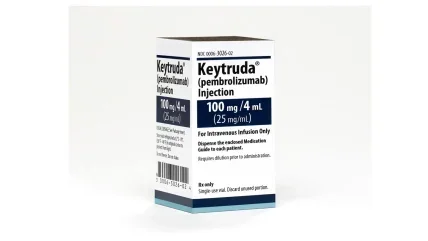
Merck, known as MSD outside of the US and Canada, has received Health Canada’s approval for Keytruda (pembrolizumab) to treat adult patients with advanced lung cancer.
Keytruda is now approved in Canada for resectable Stage II, IIIA, or IIIB (T3-4N2) non-small cell lung carcinoma (NSCLC).
The approval includes its use with platinum-containing chemotherapy as neoadjuvant treatment, followed by Keytruda monotherapy as adjuvant treatment after surgery.
This decision is based on positive results from the multicentre, randomised, double-blind, placebo-controlled Phase 3 KEYNOTE-671 trial.
The results showed improved dual primary endpoints of event-free survival (EFS) and overall survival (OS) compared to placebo treatments.
At the first interim analysis, EFS showed statistically significant results with a median follow-up of 21.4 months.
In the second interim analysis, OS demonstrated statistical significance with a median follow-up of 29.8 months.
Merck Canada oncology business unit executive director and vice president André Galarneau said: “Today, we’ve made a significant step forward with the approval of the first anti-PD-1 therapy in Canada for the perioperative treatment of resectable non-small cell lung cancer. This approval highlights our commitment to expanding treatment options for lung cancer patients.
“We’re excited to continue this progress and collaborate with community partners to help patient affected by this disease.”
Keytruda is an anti-programmed death receptor-1 (PD-1) therapy. It works by enhancing the body’s immune system to detect and fight tumour cells.
As a humanised monoclonal antibody, it blocks the interaction between PD-1 and its ligands, PD-L1 and PD-L2. This activation of T lymphocytes may target both tumour and healthy cells.
Pembrolizumab was first approved in Canada in 2015. It is now approved for several indications, including advanced renal cell carcinoma, bladder cancer, non-small cell lung carcinoma, and primary mediastinal B-cell lymphoma, among others.
In August 2024, Health Canada approved pembrolizumab in combination with enfortumab vedotin for the treatment of adult patients with urothelial cancer.
Recently, long-term positive follow-up data of Padcev (enfortumab vedotin-ejfv) and Keytruda were announced. Pfizer and Merck are assessing the combination for urothelial cancer.






